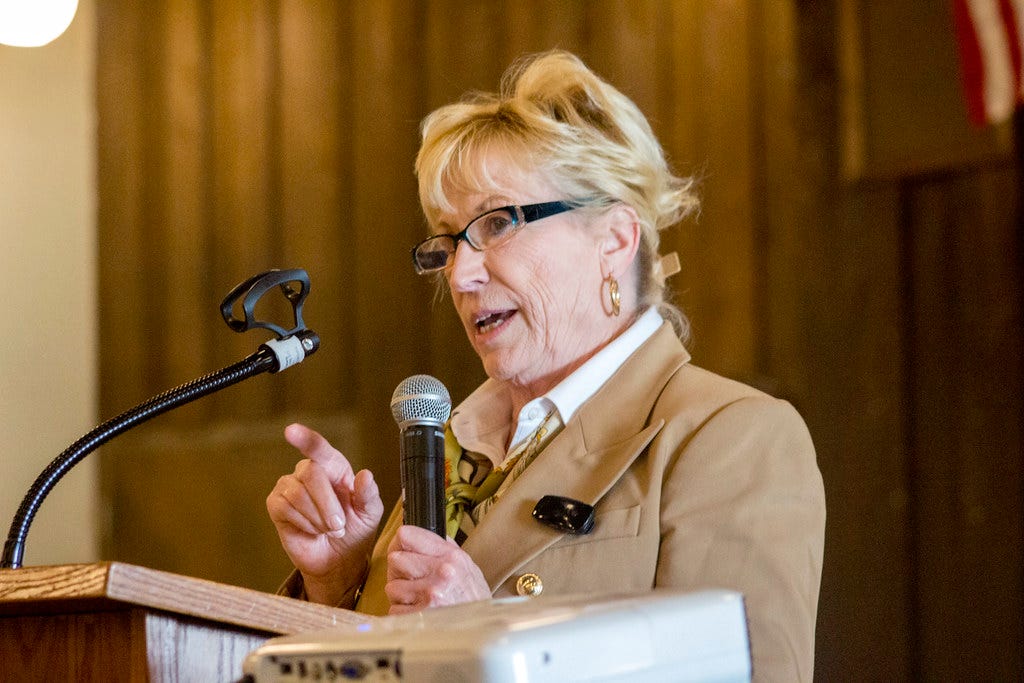Lou Ann Linehan, who has represented District 39 in the Nebraska state senate for nearly eight years, has championed school choice as a priority issue in the Unicameral.
“I believe in public education, but it’s not right for everybody,” Linehan said. “I have tried to get Nebraska out of the dark ages and have school choice. Iowa has it. Iowa lets kids go anywhere they want to and gives the child $7,000 — which follows the child. In Nebraska, we have nothing.“
Hard Choices
In the past, Nebraska parents who wanted to send their children to a school other than the one assigned to them by the government (based on their address) were required to physically move to another district or pay out-of-pocket for a private school. Linehan has six grandchildren in public schools, some of whom moved specifically to attend different schools.
“One moved from Lincoln to Norris, and one moved from Grand Island to Aurora,” Linehan said. “So they have choices, right? But what about the kids in Grand Island that don’t have a choice? Or what about the kids in Omaha? They have no choice. Yet, you get 80% of the kids not reading at proficient levels. Those people need to have options.”
School Boards & the Education Lobby
In theory, public schools would be held accountable by elected school boards, but these boards have become increasingly unresponsive and even antagonistic to the general public. Even elected officials like Linehan face blockades when trying to speak to local school board members.
“I, Senator [Ben] Hansen, Senator [Justin] Wayne, went out to talk to the [Omaha] school board,” Linehan recalled. “They’re elected members. We’re senators. We were told, ‘We can’t talk to you. We hire people to talk to you. We’re not allowed to talk to you.’ Now, there’s something very wrong with elected people who don’t think they can talk to their state senators. … And it’s not just Omaha, guys. This is going on all over the school boards in total. Not to talk to the press. Not to talk to constituents. Not to talk to anybody until they run it through the main office. So we get the tail wagging the dog.”
Linehan also commented on collusion between school boards and teachers’ unions. “They all work together. Now, isn’t it a little odd? The School Board Association would be hand-in-hand with the union every time there’s a school bill on the floor. You would think there would be some separation between management and the union.”
School Choice Repeal & Linehan’s Successor
Linehan was able to bring school choice to Nebraska in the form of “Opportunity Scholarships” last year. Nebraska families are already benefiting from the funding provided, and according to a recent fundraising email, over 1500 scholarships have been awarded.
This move has been met with resistance by teachers’ unions afraid of the competition presented by the $10 million a year in funding. An anti-school choice group called “Support Our Schools Nebraska” was formed to gather signatures for a ballot initiative to cut the education funding, a move that is currently being litigated.
Tony Sorrentino, a tax attorney and business owner specializing in employee benefits and group health plans, is running to fill Linehan’s seat after she is termed out at the end of this year. I asked him if he would make school choice a priority bill if the current funding is revoked via ballot initiative.
“If it [school choice] gets taken away, we’ve learned a lot in the process and we’ll come back with a better bill and stronger bill,” Sorrentino said. “I’ve talked to the Millard Public School Superintendent and the Elkhorn Public School District about it. And frankly, you’d expect them to be against it. But when you sit down and talk to them, there are one or two valid points that I think you could work into the bill and make it very stable and still accomplish what it needs to.”
The November election could be pivotal for school choice with candidates Bob Andersen, Ben “Felix” Ungerman, and Roxie Kracl poised to flip seats from Democrat to Republican in districts 49, 3, and 15, respectively. I asked Linehan if she thought a few additional votes could make the difference in passing a school choice option like Iowa’s, where the money follows the child. She seemed optimistic that it would.






School boards antagonism to parents reflects the decades of gradual delegation of powers to unelected administrators. They've become conditioned to accept a subsidiary role, a rubber-stamp function, to defer to the experts. Check your statutes, but superintendents generally won't have any statutory or common law powers - only school boards. Take back your authority. Move the super off the dais and back to the staff table. Audit district policies, confirm with statute - did this or that power need to be delegated to a superintendent...or can we do it ourselves? Nothing will change unless you do.